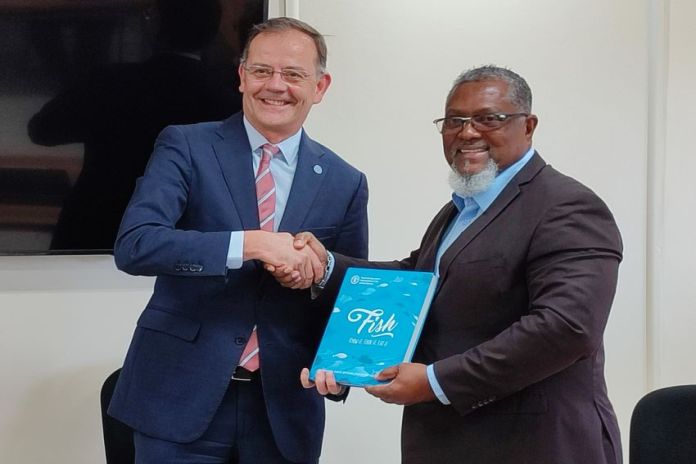By Fabian Belgrave
BRIDGETOWN, Barbados, (GIS) – The government of Barbados is developing a framework to make Barbados’ agricultural sector one of excellence, and it is receiving assistance from the Food and Agriculture Organization (FAO) of the United Nations.
Minister of agriculture, food, and nutritional security, Indar Weir, stated this in a recent courtesy call with the assistant director-general of the FAO, Manuel Barange, and country representative, Juan Cheaz, at the ministry’s headquarters, Graeme Hall, Christ Church, where Cheaz gave a progress report on the Country Programme Framework Agreement that was signed last year.
Weir, who stated his interest in hearing the report, said:
“We will use this opportunity to see how we can build on what is being done […] . We will work with various stakeholders, in particular, our international stakeholders, who will give us an opportunity to be able to benefit from research and development and also from the work being done globally, to help Barbados’ agricultural sector.”
Cheaz, said the organisation had set a target to achieve the different priorities in the Country Programme Framework by allowing access to $17 million, which represents a significant percentage of funds to be utilised within a four-year period, between 2022 – 2026. “We are around 50 percent of resource mobilisation, including active projects and pipeline, by the end of this year.”
The FAO Country Representative also noted that one of the components needed was a food system assessment, which would bring the ministry of health and wellness and the ministry of education on board, as they would be major stakeholders.
Assistant director-general Barange, who is also the director of fisheries and aquaculture division, indicated that a multifaceted approach towards sustainable development, encompassing aquaponics farming, fishing harbour operations, and innovative agricultural techniques, like the use of sargassum seaweed, is necessary.
Barange was able to observe, first-hand, the transformative impact of implementing silage as a fertiliser on crop production, after visiting the processing site. “This innovative approach not only enhances agricultural yields but also reduces waste, contributing to the overall sustainability of the agricultural sector.”
Recognising Barbados’ significant production of fish waste, whereby 3,000 tons of fish waste goes to the landfill, the FAO director advocated for the adoption of circular economy principles to recycle waste into valuable resources.
“By repurposing fish waste, Barbados can mitigate environmental pollution and foster sustainable practices within the agricultural sector.”
Barange noted that the FAO eagerly anticipates the formalisation of agreements for broader programme funding, signalling a crucial step towards implementing sustainable agricultural initiatives in Barbados. These agreements would pave the way for the seamless execution of projects aimed at enhancing agricultural productivity and environmental resilience.





